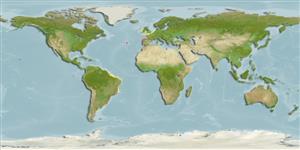>
Blenniiformes (Blennies) >
Blenniidae (Combtooth blennies) > Salariinae
Etymology: Hypleurochilus: Greek, hypo = under + Greek, pleura = in the side of + Greek, cheilos = lip.
More on authors: Quoy & Gaimard.
Environment: milieu / climate zone / depth range / distribution range
Écologie
marin démersal. Tropical
Southwest Atlantic: Paraíba, Brazil (Ref. 57756) to Uruguay (Ref. 35204) and Argentina (Ref. 86332). Northeast Atlantic: Azores (Ref. 35204).
Taille / Poids / Âge
Maturity: Lm ? range ? - ? cm
Max length : 8.9 cm TL mâle / non sexé; (Ref. 116953)
Adults feed primarily on amphipods and isopods (Ref. 9062). Oviparous. Eggs are demersal and adhesive (Ref. 205), and are attached to the substrate via a filamentous, adhesive pad or pedestal (Ref. 94114). Larvae are planktonic, often found in shallow, coastal waters (Ref. 94114).
Life cycle and mating behavior
Maturité | Reproduction | Frai | Œufs | Fécondité | Larves
Oviparous, distinct pairing (Ref. 205).
Menezes, N.A. and J.L. Figueiredo, 1985. Manual de peixes marinhos do sudeste do Brasil. V.Teleostei (4). Museu de Zoologia, Universidade de São Paulo, Brazil. 105 p. (Ref. 9062)
Statut dans la liste rouge de l'IUCN (Ref. 130435: Version 2024-2)
Menace pour l'homme
Harmless
Utilisations par l'homme
Outils
Articles particuliers
Télécharger en XML
Sources Internet
Estimates based on models
Preferred temperature (Ref.
123201): 14.9 - 27.7, mean 23.6 °C (based on 330 cells).
Phylogenetic diversity index (Ref.
82804): PD
50 = 0.5005 [Uniqueness, from 0.5 = low to 2.0 = high].
Bayesian length-weight: a=0.00832 (0.00448 - 0.01544), b=2.99 (2.82 - 3.16), in cm total length, based on LWR estimates for this species & (Sub)family-body (Ref.
93245).
Niveau trophique (Ref.
69278): 3.3 ±0.53 se; based on food items.
Résilience (Ref.
120179): Haut, temps minimum de doublement de population inférieur à 15 mois (Preliminary K or Fecundity.).
Fishing Vulnerability (Ref.
59153): Low vulnerability (10 of 100).
